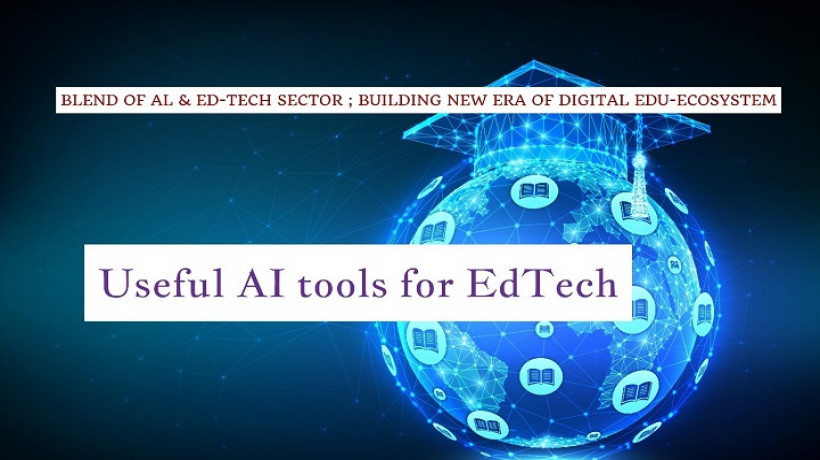Useful AI tools for EdTech
The incredible combination of AL and ML has elevated and advanced the entire EdTech sector. Let's look at the active AI TOOLS for EdTech Sector.
May 28, 2023

Writer I Blogger

Some of the applications of machine learning & artificial intelligence in the EdTech industry are listed here. For more information about such tools, you can visit CoachingSelect blogs.
1. A Step Towards Predictive Analysis
There was once a time when "old school" teachers had biases regarding a student's future. This did, in some cases, lower the morale of young people who began to feel a little inferior to others. Here, "proof-eccentric" data is used in place of favoritism in the predictive analysis. Predictive analysis, which makes use of the art of machine learning in EdTech, takes the lead by examining both historical and current data in order to forecast future outcomes.
In order to predict future events or those that are otherwise unknown, predictive analytics uses a variety of statistical techniques from data mining, predictive modeling, and machine learning.
2. Process Efficiency is not a Far-Sighted Dream
Teachers need a better system that takes care of everything and allows them to concentrate on a more important goal, namely spreading their knowledge to the general public. The days when teachers struggled to keep separate logs for each of their students are long gone.
One of the main advantages of machine learning in education is that machines have taken over the workload by methodically organizing content and managing the daily curriculum of the teachers.
The outcome is clear: Students perform incredibly better and teachers effectively teach. The gap between students and teachers is another area of education where machine learning is crucial. The automated system will make appointments for students based on their regular schedules and those of the teachers, so they won't have to chase them down.
Example: A web platform called Netex Learning uses machine learning to enable tutors to create their own daily lesson plans. The best part is that teachers already have the power to structure their lesson plans around content that includes audio, video, custom assignments, and discussion forums.
3. Revolutionizing Learning with Smart Tutors
The touch of application and real-world implications have always been restrained in traditional lectures. There has always been room for improvement, and machine learning technology introduces just that.
The much-needed trend known as "smart tutors" is slowly but surely leaving its mark on the educational landscape. In addition to regular assessment quizzes, the lectures are being converted into video tutorials, flashcards, smart guides, and educational apps.
The one thing that stands out is that students and teachers have constant access to online learning resources. Virtual tutors are yet another form that the smart tutor system is taking. This may be the best strategy for positioning your educational institution as an actual "edtech" organisation that has embraced machine learning.
Let’s take a look at the BEST AI tools for EdTech innovation on board:
Students can evaluate each other while giving feedback using the Gradescope AI tool, which speeds up tasks that would otherwise take a long time. Gradescope uses a combination of machine learning (ML) and artificial intelligence (AI) to make grading simpler and more efficient.
Teachers can concentrate on the more important tasks by outsourcing these ones. The teacher can use Gradescope to grade paper-based tests, online homework, and projects all in one location.
Students and faculty can use Nuance's speech recognition software, which is based in Burlington, Massachusetts. For students who struggle to write or type, the company's Dragon Speech Recognition product can transcribe up to 160 words per minute. For students who need accessibility features, the tool also supports verbal commands to navigate documents.
Many additional features are available with Dragon, including the ability to transcribe worksheets, reading lists, lesson plans, syllabi, and more at a speed that is three times faster than typing. While doing so, it achieves 99% accuracy.
Ivy is a collection of chatbot AI tools that were created especially for colleges and universities. They help with a variety of aspects of the university process, including deadlines, tuition costs, enrollment, and application forms. Ivy also has the ability to plan recruitment campaigns using the data gathered.
The AI tool can offer students the information they desperately need, including crucial specifics on loans, scholarships, grants, tuition payments, and more. Because it can create customised chatbots for each department, it can be utilized across all of them.
Carnegie Learning, a leading provider of curriculum and educational technology, uses AI and machine learning in its learning platforms for college- and high-school-aged students. For the subjects of math, literacy, or foreign languages, these platforms provide a variety of original solutions.
The supplier is the recipient of numerous accolades for education, including "Best Artificial Intelligence/Machine Learning App" at the Tech Edvocate Awards. Researchers from Carnegie Mellon University created one of its products, the MATHia software. Additionally, it provides Fast ForWord, a reading and language programme that aids in the development of cognitive skills in students.
It is a comprehensive courseware solution that combines openly available content with adaptive learning technology to create a more individualised learning environment for each student.
Each Alta product includes all of the text, video, examples, and assessments required to complete a course. Additionally, it is offered in a variety of courses, including those in the subjects of math, statistics, economics, and chemistry.
The following are some of Knewton's Alta's key characteristics:
• Technology for adaptive learning
• Personalised learning opportunities
The way forward of AL in EDTECH
The incredible combination of AL and ML has elevated and advanced the entire ed-tech sector. People are switching to automated platforms supported by next-generation technologies because traditional approaches to managing educational operations are no longer effective. So there is still much to be done in both machine learning and education. To get everyone on board and appreciate your efforts, all your education department needs to do is comprehend the demands of the moment.
So, quit the traditional methods of education and embrace applications of artificial intelligence and machine learning. You can easily locate companies in the digital ecosystem that have experience creating machine learning tools and applications. Now that you have a clear understanding of how machine learning is altering the educational landscape, the first step entails looking up machine learning-equipped companies that can assist you in developing a practical AI & ML model.

